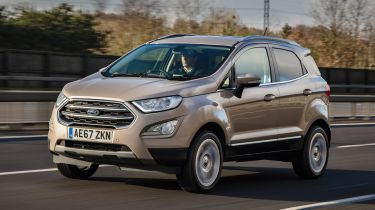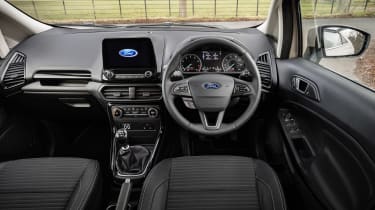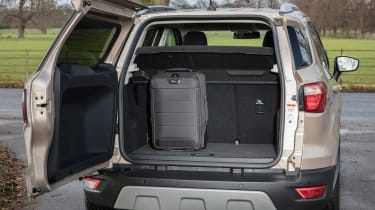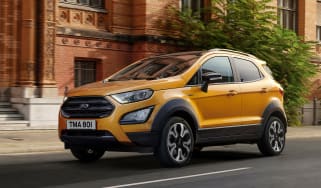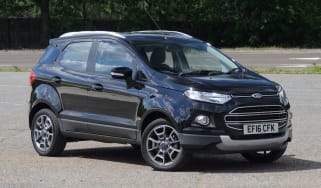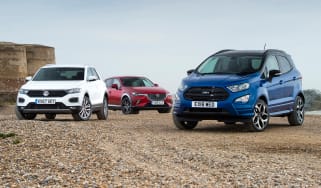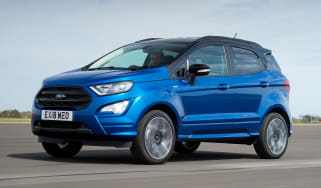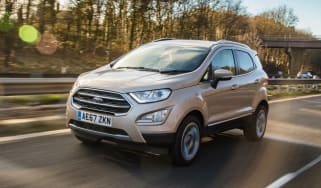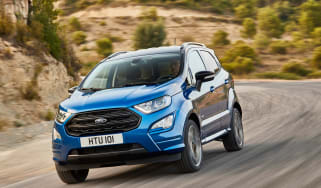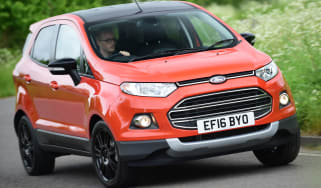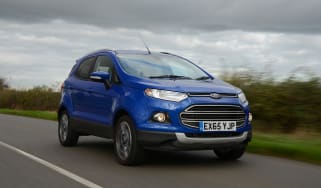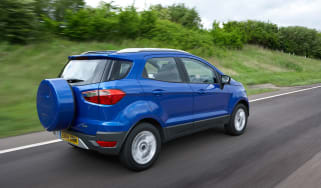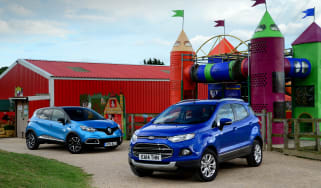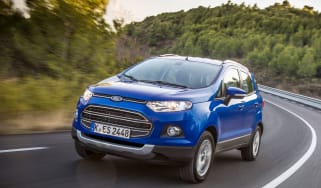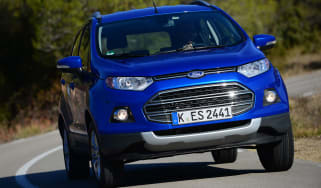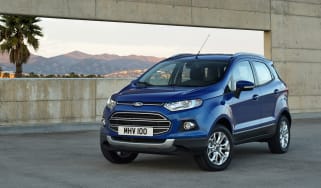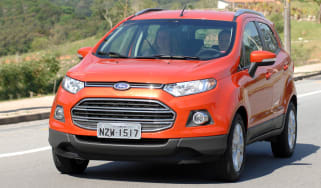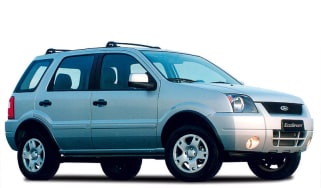Ford EcoSport (2014-2023) review
With below-par practicality and uninspiring road manners, the Ford EcoSport can’t match the best small SUVs

This is a review of a new 2014-2023 Ford EcoSport. If you are interested in information about a used Ford EcoSport please follow the links provided.
The Ford EcoSport has never quite managed to match the best models in the small SUV class, although a facelift back in 2017 helped address a few key issues. In particular, there were big improvements in the cabin brought about by a smart Fiesta-inspired dashboard, while revised on-board tech meant that Ford's smallest crossover didn't feel quite so out-dated alongside newer rivals.
However, the Ecosport wasn't anywhere near the top of the class in 2017, and it certainly isn't challenging for top honours today. Mechanically and in terms of practicality, the EcoSport remains flawed; clumsy driving characteristics, poor interior space and unhelpful quirks like the side-hinged rear door all blot its copybook. Our advice is to look elsewhere for your next small SUV.
About the Ford EcoSport
Small SUVs have been extremely popular in the UK over the last few years, although we think you'd need to be a diehard Ford fan to choose the EcoSport over a wide range of talented small SUV rivals. Indeed, Ford's own Puma crossover is not much more expensive to buy than the EcoSport and offers a lot more bang for your buck.
Used - available now

2023 Land Rover
Range Rover Evoque
33,698 milesAutomaticPetrol1.5L
Cash £22,500
2024 Skoda
Octavia Estate
50,100 milesManualPetrol1.5L
Cash £13,797
2020 Hyundai
Tucson
38,217 milesManualPetrol1.6L
Cash £13,497
2023 Ford
Focus
38,013 milesManualPetrol1.0L
Cash £13,697The EcoSport arrived in the UK in 2014, and received a much needed facelift three years later to help keep up with the small SUV pack. However, despite the EcoSport being based on the Fiesta supermini, it really does struggle against the slew of more talented rivals available at a similar price. The Citroen C3 Aircross and Vauxhall Crossland are actually cheaper to buy, while the Peugeot 2008 is a capable crossover that offers plenty of style in a small package. Buyers also have the Renault Captur and Dacia Duster to consider and, as ever, the VW Group has its own contenders in the shape of the Volkswagen T-Cross, SEAT Arona and the Skoda Kamiq. Just to add to the myriad choices, the Hyundai Kona and Kia Stonic are equally worth a look.
For 2018, Ford moved EcoSport production of the European EcoSport from India to Romania, and gave the car a number of changes to make it more appealing. The range now includes Titanium, ST-Line and the off-road inspired Active trim-level.
As mentioned above, the EcoSport shares running gear with the last-generation Fiesta, but while that car was fun to drive, the addition of raised suspension and a tall body hasn't translated into an enjoyable drive here - if you are looking for a decent steer from your small crossover, then the Ford Puma could be the right choice.
Power comes from a 1.0 EcoBoost three-cylinder turbo petrol in 125PS or 140PS guises, with 123 or 138bhp respectively. A six-speed manual gearbox and front-wheel drive is standard across the range.
Engines, performance and drive
The EcoSport should be the best driver’s car in the crossover market. After all, under the skin it features the mechanicals from the Ford Fiesta, which is one of the most entertaining superminis ever produced. Somehow, though, the DNA got lost in translation, and the first EcoSports were really quite dire from behind the wheel.
Ford responded to widespread criticism of these cars, and upgraded European-spec models with revised suspension. The results are still a bit mixed, though. The EcoSport has the Fiesta’s nicely weighted steering, but the ride quality remains lacklustre and the body still rolls quite a bit.
Even on ST-Line models, which come with specially tweaked sports suspension, there’s still plenty of body roll and the ride remains busy, softly wallowing around even on roads that aren’t all that bumpy or undulating.
To make matters worse, the chassis is upset by even small bumps, and due to the short wheelbase, the EcoSport seems to lumber down the road rather than float over it. This would be disappointing from any manufacturer's product, but it’s especially so from Ford, with its reputation for producing thrilling drivers’ cars.
0-62mph acceleration and top speed
The 1.0-litre EcoBoost three-cylinder has always been a lovely engine, but in the EcoSport it feels a little bit flat. Again, the extra weight compared to the Fiesta means it’s also just too thirsty when you drive it with the vigour you need to keep the crossover ticking along.
If you opt for the 123bhp variant you'll see a 11.0 second sprint time from 0-62mph, with a largely irrelevant 111mph maximum.
The 138bhp version is only available with the sportier ST-Line models. On the plus side, it’s decently refined and economical, but with a 0-62mph time of 10.2 seconds, it still doesn't feel quick enough. The overall result is that it's nowhere near as rewarding as it is when fitted to the Fiesta. However, seeing as the more powerful car is only around £400 more expensive it's might be worthwhile to stump up the extra cash if you can.
MPG, CO2 and running costs
The EcoSport range no longer includes a diesel-engined version, but as most buyers will drive their cars on urban roads, the entry 123bhp 1.0-litre EcoBoost petrol engine looks a reasonably strong choice. Paired with a standard six-speed manual gearbox, both the 123bhp and 138bhp versions manage a claimed 45.6mpg fuel economy under WLTP tests, with emissions of 141g/km and 142g/km respectively.
But in order to get close to the official economy figures, you have to drive the Ford EcoSport incredibly conservatively. Press on and you’ll see your fuel returns plummet, with some owners reporting figures as low as 35mpg.
Insurance groups
Even if the engines don’t quite deliver on their promise, the EcoSport shouldn’t bring steep annual insurance premiums. The 123bhp 1.0 EcoBoost Titanium and ST-Line are in group 12, while the 138bhp ST-Line sits in group 14. Splitting the two is the off-road inspired Active version in group 13.
Depreciation
Our experts predict that the Ford EcoSport will retain around 45 to 49 per cent of its new value over the course of three years and 36,000 miles of ownership. That's a reasonable performance, although the Skoda Kamiq manages an average of 54 per cent over the same three-year period.
To get an accurate valuation on a specific model check out our free car valuation tool...
Interior, design and technology
Since the major revisions at the start of 2018, the EcoSport has shared its basic interior layout with the latest Ford Fiesta, and the extensively redesigned cabin is the most impressive aspect of the SUV. Most of the switchgear on show is plucked straight from the Fiesta, with a similar tablet-style infotainment screen perched on top of the centre console. Just as in the firm’s big-selling supermini, it’s extremely slick to use, while the screen resolution is bright and sharp.
Alongside a new, clearer instrument panel are some decent interior plastics, which make the EcoSport's cabin a much nicer place to sit than in the previous model. It leaves you with a general feeling that the EcoSport is edging closer to the likes of the SEAT Arona, Kia Stonic and Peugeot 2008, but the facelift cannot work miracles, and many of the rivals have much more of an upmarket, plush feel than the Ford.
Standard equipment is pretty generous with the entry Titanium trim including 17-inch alloy wheels, auto headlights and wipers, rear parking sensors and cruise control. The ST-Line cars add sports suspension, a styling kit and upgraded upholstery, while the Active versions feature chunky black exterior trim to help give more of an off-roader look.
Sat-nav, stereo and infotainment
For the 2018 update, Ford upgraded the tech to include the SYNC 3 touchscreen infotainment system, available now in 8-inch size across the range. It comes complete with Apple CarPlay, Android Auto and a DAB radio. The £650 X-Pack includes, among other luxuries, a ten-speaker B&O audio system.
Practicality, comfort and boot space
The EcoSport is a crossover based on the Ford Fiesta, with similar dimensions, so Ford's smallest SUV is never going to be the most spacious car. Truth is, it doesn’t need to be, as rival models don’t exactly score on practicality, either. But, the car is still left in the shade by some competitors – the Peugeot 2008 and Renault Captur offer more space.
Dimensions and size
At just over four metres, the EcoSport is the same length as a Ford Fiesta, so it’s one of the most compact crossovers on the market. Ford used to quote the same measurement when the EcoSport featured its rear-mounted spare wheel, but now this has been taken off the tailgate, you can trust the measurement.
The spare wheel mounting caused controversy when the car was launched, with many people criticising it as old-fashioned and impractical. Ford therefore decided to make it an option on the updated EcoSport, cleaning up the lines around the rear of the car and making it easier to park. Trouble is, it couldn't be combined with the rear-view camera on other trim levels. So, with no option to stow a spare under the boot floor, every model now comes as standard with a tyre inflation kit.
Leg room, head room & passenger space
Cabin space in the EcoSport is about average for the class, but that’s not saying much. After all, rivals in this market include the Nissan Juke, which is notoriously tight in the back. Certainly, the likes of the Peugeot 2008 leave the Ford trailing for rear seat space: rear legroom is particularly tight in the EcoSport, with the result that anybody close to six-foot tall in the back will end up with his or her knees pressed into the seat in front.
Boot space
As with passenger space, so with the boot, the EcoSport's capacity of 355 litres is only average – the Renault Captur offers 100 litres more than that (albeit only when you move the sliding rear seats all the way forward), while most competitors provide around 20 litres of extra space with their back seats in their normal position.
The 355-litre boot doesn’t place the EcoSport near the front of the pack on practicality either, beaten by the 400-litre capacity of the SEAT Arona – itself not the most cavernous in class.
It’s not only the size of the boot that lets the EcoSport down, though, as access to the load bay is hampered by the side-hinged rear door. This design just seems needlessly old-fashioned, when every other car in the class uses a more practical top-hinged hatch. Plus it’s hinged on the left-hand side, which obstructs loading if you’re parked with that side of the car next to a pavement.
Reliability and safety
While the low-grade feel in the cabin might have you worried about the long-term durability of the EcoSport, there should be no questioning the mechanical components.
Ford has been using the EcoBoost petrol engine for a few years across a number of models in its range, and no major issues have been reported in that time. The same is true of the six-speed manual gearbox.
Reliability is an area where the car’s Brazilian origins should help: the EcoSport was designed from the outset to be rugged and stand up to use on poor-quality South American roads, and developed to be easy to fix if anything does break.
The EcoSport received a solid 88.95 per cent score in our Driver Power customer satisfaction survey, which meant it finished in 26th place on a 75-car list. Ford as a manufacturer ranked 25th out of 29 automakers in the best brands poll.
On the safety front, it’s a case of not bad, but could do better, with the EcoSport awarded a four-star crash test rating by Euro NCAP . Its adult protection score is quite good, at 93 per cent, but a score of 77 per cent for child occupant protection is not great for a family car, and a 55 per cent score in the safety assist category of the test shows just how much safety kit is either left on the options list or simply not available at all.
The Driver Assistance Pack is available for an extra £650 and includes a Driver Impairment Monitor (Driver Alert), Blind Spot Monitoring (BLIS) with Cross Traffic Alert, Front Parking Sensors and a Auto High Beam function.
Warranty
Ford supplies the EcoSport with a three-year/60,000-mile warranty as standard, and the package includes a year’s paint defect cover and a 12-year anti-perforation guarantee.
As with many rivals, the company also allows buyers to extend the standard warranty: it can be boosted to four years and 80,000 miles, or five years and 100,000 miles for a one-off payment.
Servicing
It’s recommended that the EcoSport is serviced every 12,500 miles or once a year, and Ford offers the option of a three-year fixed-price maintenance package. Buyers who choose this also benefit from an extension to the one-year roadside recovery and assistance package that comes as standard with the car.
What do owners think of the Ford EcoSport?
Here’s what owners in the 2024 Driver Power survey thought of the Ford EcoSport.
| What they like | What they don't like |
| “The higher driving position gives a good view, but the car doesn’t feel so big that it’s intimidating.” | “The reliability has been okay, but some internal materials are flimsy and they mark very easily.” |
| “For a small car it has ample legroom, even for a taller person, and it’s easy to get in and out of, too.” | “The big pillars block the view in corners, and the dash top is susceptible to glare in bright sunlight.” |
| “Compared with all of the cars I’ve that I’ve owned in the past, my EcoSport is a dream to drive.” | “I have less boot space than I had in my VW Polo, and the space between the back seats and boot lip is poor.” |
| “The navigation is accurate, dependable and very easy to use with its clear images and good narration.” | “The touchscreen is too complicated and the display is too bright when reversing in the dark. It’s distracting.” |
| “It’s reliable, has good fuel economy, does everything I need it to, and all at a sensible price.” | “The navigation is poor. I put in the postcode for a restaurant and it took me to the motorway instead.” |
| “The tailgate is side-hinged, rather than opening upwards, which is so much easier with my disability.” | |
| “My most comfortable car ever. I can make longer journeys without back or leg discomfort, and the seat height is perfect so I can get in and out easily, plus there’s plenty of headroom.” | |
| “The overall running costs are okay, if nothing to shout about. Insurance is reasonably sensible, but the fuel consumption is a bit heavy.” | |
| “Ford got it right with the suspension settings; the EcoSport’s ride is very well judged. The handling is also really engaging, the steering responds immediately and the weighting is perfect, so the car feels agile.” | |
| “Cabin space is more than adequate given the flexibility of the front seats. The boot is a good size, the flush loading lip is handy and the two compartments set into the boot floor boost practicality. For a small car it’s really very spacious.” |

